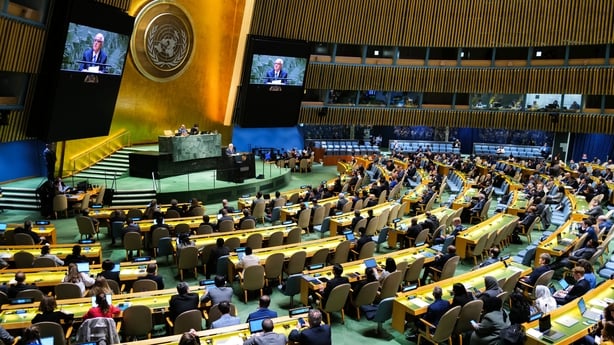After the announcement last week that Spain, Norway and Ireland would recognise the state of Palestine, a visibly-delighted Palestinian Ambassador to the United Nations came to talk to the press.
"We need somebody to take pictures," Riyad Mansour said, ushering the Irish, Spanish and Norwegian envoys into an impromptu photoshoot just outside the UN Security Council.
"A glorious day today," Mr Mansour declared as the four ambassadors stood shoulder-to-shoulder.
Like so many UN moments, this one was heavily laden with symbolism, but it comes with some tangible substance too.
The addition of these three countries will bring the tally of UN member states to 145 (146 including the observer state of the Holy See) out of 193.
That means that far more countries at the UN recognise the state of Palestine than don't.
A number of other EU countries, including Slovenia and Malta - both of which currently occupy rotating seats on the UN Security Council - are also expected to follow suit.
Given this sizeable count, some UN diplomats quietly wondered why Ireland hadn't made the move before, given its long history of support for Palestinian rights.
After all, several European countries already recognise Palestine.
Bulgaria, Cyprus, Hungary, Poland, Romania, Slovakia recognised it in 1988, before joining the bloc.
But in 2014, Sweden was the only existing EU member to do so - until today.
Now, in the bigger picture at the United Nations, it’s clear that the numbers are only going in one direction.
Even France, a permanent member of the Security Council, has hinted it could get on board with president Emmanuel Macron declaring in February that recognition of a Palestinian state was "not a taboo" for France.
It follows a General Assembly vote earlier this month, when 143 UN member states voted in favour of Palestinian membership of the UN, calling on the UN Security Council - where the US had previously vetoed the move - to reconsider the matter favourably.

All this, the supporters of Palestinian statehood hope, is gathering momentum towards the implementation of a two-state solution.
That is not how Israel, nor its closest ally, the US, see it.
"This is a terror state that you are recognising today," Israeli Ambassador to the United Nations Gilad Erdan said in a post on social media following last week’s announcement, "an entity of murderers, rapists and kidnappers".
Meanwhile, the United States has long been clear that while the Biden administration supports a two-state solution, nothing should happen until Israel and the Palestinians agree a bilateral peace deal.
There are also major questions over the borders of a proposed Palestinian state, not to mention the status of Jerusalem as its capital.
US diplomats argue that the Israelis and Palestinians need to work this out first and that recognising a Palestinian state now is a case of putting the cart before the horse.
Israel has warned of "severe consequences" for countries that recognise a Palestinian state.
But now, as outrage grows inside the United Nations over Israel’s prosecution of its war in Gaza, member states are keen to show their solidarity with Palestinians, leaving Israel and the United States increasingly isolated.
"It shows that if the US will not compromise on the issue at the UN, other countries will simply work around the UN rules and blockages," Richard Gowan, UN Director at the Crisis Group, a New York-based think tank, told RTÉ News.
"Ultimately it should be in the interest of the US and Israel to negotiate the terms for a two-state solution that the UN can endorse, rather than allow other countries to recognise Palestine willy-nilly.
But Israel and the US are in no mood to make any big gestures at the UN, he said.
"In fact, Israel simply sees such moves as a further sign that the world is biased against it," he added.







